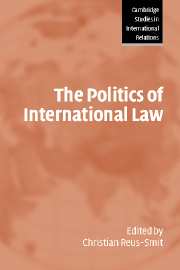Book contents
- Frontmatter
- Contents
- List of contributors
- Preface
- 1 Introduction
- 2 The politics of international law
- 3 When states use armed force
- 4 Soft law, hard politics, and the Climate Change Treaty
- 5 Emerging customary norms and anti-personnel landmines
- 6 International law, politics, and migrant rights
- 7 The International Criminal Court
- 8 The Kosovo bombing campaign
- 9 International financial institutions
- 10 Law, politics, and international governance
- 11 Society, power, and ethics
- Bibliography
- Index
- CAMBRIDGE STUDIES IN INTERNATIONAL RELATIONS
11 - Society, power, and ethics
Published online by Cambridge University Press: 22 September 2009
- Frontmatter
- Contents
- List of contributors
- Preface
- 1 Introduction
- 2 The politics of international law
- 3 When states use armed force
- 4 Soft law, hard politics, and the Climate Change Treaty
- 5 Emerging customary norms and anti-personnel landmines
- 6 International law, politics, and migrant rights
- 7 The International Criminal Court
- 8 The Kosovo bombing campaign
- 9 International financial institutions
- 10 Law, politics, and international governance
- 11 Society, power, and ethics
- Bibliography
- Index
- CAMBRIDGE STUDIES IN INTERNATIONAL RELATIONS
Summary
In his early guise as a student of international law, Hans Morgenthau stressed the difference between ‘political’ and ‘non-political’ international law. The latter, which encompassed rules governing ‘respect to diplomatic privileges, territorial jurisdiction, extradition, wide fields of maritime law, arbitral procedure, and so forth’, fell outside the political realm because it reflected ‘the permanent interests of states to put their normal relations upon a stable basis by providing for predictable and enforceable conduct with respect to these relations’. Political international law included the remaining panoply of international rules, from treaties of alliance to grand legalistic schemes for collective peace and security. These were deemed ‘political’ because they reflected underlying social forces, most notably the prevailing balance of power and configuration of states' interests. Such rules, Morgenthau insisted, were ‘always precarious; the interests which they are supposed to serve appear permanent and definite, whereas they are actually exposed to continuous change and are more or less uncertain; and consequently, the rights and duties established by them appear to be clearly determined, whereas they are subject actually to the most contradictory interpretations’.
The perspective on the politics of international law advanced in previous chapters differs from Morgenthau's in three important respects. First, we share his concern with the impact of underlying ‘social forces’ on the nature and practice of international law, and we understand these forces in political terms. But our conception of the socio-political realm is more expansive than his.
- Type
- Chapter
- Information
- The Politics of International Law , pp. 272 - 290Publisher: Cambridge University PressPrint publication year: 2004
- 1
- Cited by



